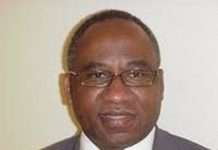Do you agree? Hear what the septuagenarian has to say.
Pharm. Moses Chiedozi Azuike was registrar / secretary of the then Pharmacists Board of Nigeria (1982-1985) and one of the few pioneer staff of the National Agency for Food and Drug Administration and Control (NAFDAC) when it was established in 1993. In this interview with Adebayo Folorunsho-Francis, the 75-year-old Fellow of the Pharmaceutical Society of Nigeria (FPSN) explains why he thinks the pharmaceutical profession has experienced a giant leap after suffering untold repression, amid threats from several quarters. Below are excerpts from the interview:
Tell us a bit about yourself, especially your early days.
I was born on 21st August 1938 in Egbu, Owerri North Local Government, Imo State. Presently, I am married and have four daughters and two sons (not forgetting my six grandchildren). I had my secondary school education at St. Augustine’s Grammar School Nkwerre, Imo State, from 1953 to 1957.Thereafter I attended the then Nigerian College of Arts Science and Technology, Ibadan branch (1958-1960) and the University of Ife, now Obafemi Awolowo University (1961-1964).
When did you qualify as a pharmacist?
I became registered as a pharmacist in June 1964, having obtained the Joint Diploma in Pharmacy from the University of Ife and the then Pharmacists Board of Nigeria. I later returned to the University of Ife during the 1966/67 academic session and obtained the B.Pharm (Hons) degree in June 1967.
Tell us more about how you started your pharmacy career.
My working career, which spanned over 34 years, was entirely within the Federal Public Service. I started as a hospital pharmacist at the General Hospital, Lagos (1964-1966). After the Civil War, I worked briefly at the Federal Medical Stores in Oshodi (1971). I left later to work at the Pharmaceutical Inspectorate Unit and the Narcotics Unit in Yaba. I was registrar/secretary of the then Pharmacists Board of Nigeria from February 1979 to December 1986. Thereafter I was moved to the Federal Ministry of Health Headquarters, Ikoyi, as assistant director and later deputy director responsible for drug control. I became one of the pioneer staff of the National Agency for Food and Drug Administration and Control (NAFDAC) on its establishment and take off in 1993. I retired from the agency in August 1998 as the pioneer director of Narcotics and Controlled Substances Directorate. Thereafter I served as consultant to the agency until December 2000.
There is a school of thought that says you spent a greater part of your service on foreign mission. How true is this?
Well, in the course of my career in the public service, I was privileged to be a beneficiary of a number of training programmes, particularly in the area of drug control. In 1975, I was a beneficiary of the United Nations Fellowship for a training course at the UN Training Unit Centre, Geneva, Switzerland. The training was on Drug Control Administration for participants from Africa, Asia, the Middle East and the Caribbean.
In the course of that programme, I was privileged to undertake a study tour of the workings of some international and national organisations with significant roles in international drug control. These included the headquarter office of INTERPOL, then at St. Cloud, France; the U.K. Metropolitan Police, Scotland Yard, London; and the U.K Customs Training School in South end- on-Sea, near London. In 1987, I participated in the monthly International Visitors Programme of the United States Information Agency. This was a first-hand study of the strategies adopted in control of drug problems in the United States of America at government and community levels. The programme afforded me the opportunity to visit several US cities, including Washington D.C, Atlanta, New York, Philadelphia, Minneapolis and San-Francisco.
Looking back, can you confidently say studying Pharmacy was a good decision for you?
Yes, I can confidently say that I made a good decision to study Pharmacy. I believe I have had a fulfilled career as a pharmacist.
What was the profession like in your day, compared to today’s practice?
It is now 49 years since I came into the profession. As expected, significant changes have occurred since then. The number of practitioners has increased. At the time I qualified, there were less than 800 names in the register of the Pharmaceuticals Board. Today, I guess we have not less than 15,000. The population of the country has also increased. I remember that at the beginning of my career, both the imperial and metric systems of weights and measures were in use. Today, all measurements are in the metric system. The days of grains, minims and fluid ounces have given way to millilitres, milligrams and grams. The 1960s, 70s and early 80s were the eras of compounding of medicines in hospital and community pharmacies. It was then common to observe on the shelves several Winchester bottles of extemporaneously prepared expectorants, haematinics, purgatives, diuretics, antidiarrhoeals etc. from which individual patient prescriptions were filled. Solid oral preparations (tablets and capsules), which were supplied by the industry in packs of 100s and 1000s were counted out and wrapped with paper for individual patients. It was not until the mid-1980s that plastic dispensing envelopes were introduced into use in Nigeria – courtesy of the proprietor of Kakaki Chemists Ltd, Lagos.
What else has changed since then?
Local pharmaceutical manufacturing industries have increased in number, especially since the 1980s. Due to advancement in technology, local and foreign companiesare now supplying their products in individual patient packs, that is, in sachets and small containers of liquid preparations. Compounding rooms are no longer desirable in most pharmacies. Public perception of the pharmacist has also improved. The mostly one-room chemist shops of those days are giving way to properly planned community pharmacies in the towns and cities in Nigeria, even though the spread to rural communities is yet to be satisfactory.
Are there intrigues and controversies concerning pharmacy practice that still evoke memories of the past?
In the quest for proper professional recognition, pharmacy practice in Nigeria has had to go through a number of controversies. Even today, there is controversy over the role of the pharmacists in the National Health Insurance Scheme (NHIS). This is yet to be settled to the satisfaction of pharmacists.
In my early days in the profession, pharmacists were poorly remunerated in the public service. The major controversy therefore hinged on the demand to be placed on scale A salary level. The demand was based, not only on the high entry requirement of three G.C.E. “A” Level passes for admission into pharmacy school, but also on the duration of the course and schedule of duties.
Can you elaborate on these issues?
The powers that be at the time were not well disposed to granting the demand for proper remuneration, even after well-articulated memoranda were submitted to commissions set up by government to review the civil service set up. That demand was eventually acceded to in 1969 through the white paper issued on the Elwood Commission report, which incidentally did not make a favourable recommendation. After that, the next struggle was on extricating the profession from the shackles of medical doctors in the Ministry of Health and upgrading the status of the Federal Chief Pharmacist to that of a Director on salary grade level 16. At that time, Pharmacy was a Division within the Directorate of Medical Service. The Federal Chief Pharmacist, whose grading was on salary grade level 15, reported to the Permanent Secretary through the Deputy Chief Medical Adviser (DCMA).
During this period, there was sustained controversy over the role of pharmacists within the Ministry. The antagonists of the profession canvassed for pharmacists to be stripped of their drug control responsibilities (inspectorate activities, drug registration, and drug quality evaluation functions) and rather be confined to drug procurement, storage, distribution and supply in public health institutions. They were however disappointed when in 1980, the Pharmacy Division was upgraded to the status of a Directorate with a Director on salary grade level 16. The achievement was mainly as a result of well-structured argument in the memoranda submitted to the government by the then Federal Chief Pharmacist, Dr. P.O. Emafo. His efforts received support from well-meaning individuals and pharmacists such as Prof. William Osisiogu (a pharmacist) then Federal Commissioner of Water Resources, and late Augustine Nnamani (pharmacist/lawyer) then Attorney General and Federal Commissioner of Justice.
Still, the controversies over the role of pharmacy in the Ministry did not abate. It came to a head in 1988 when the then Minister of Health merged the Pharmaceutical Services Directorate and the then Food and Drugs Administration and Control Directorate to form the Food and Drug Administration and Control Department, with a pharmacist as the director.
Merging two offices together can sometimes muddle things up. Did this particular union survive?
The officers of the two departments retained their official titles either as pharmacists or as scientific officers. This was to elicit another controversy in future. When some aspects of the functions of the department were carved out to form the National Agency for Food and Drug Administration and Control (NAFDAC), there was controversy over what was to be the official title of the officers of the agency, given their multidisciplinary backgrounds. The controversy however did not last long, as wise counsel eventually prevailed and everyone accepted the “Regulatory Officer” title which is applicable in NAFDAC today.
Over the years, you must have seen many PSN presidents come and go. Was there one who really left a lasting impression on you?
I have very good impressions of most of the PSN past presidents. Among them, however, the late Sir Sam Agboifo stands out as the one of whom I have the most lasting impression. This may not be unconnected with the fact that I had a much closer personal and official relationship with him than anyone else.
His tenure was from 1982 to 1985. At that time, I was privileged to be the registrar/secretary of the then Pharmacists Board of Nigeria; and also from 1983 to 1987, secretary-general of the then West African Pharmaceutical Federation. I worked closely with him at the level of the Pharmacists Board, the Council of Pharmaceutical Society of Nigeria (PSN) and that of the West African Pharmaceutical Federation. He was a selfless leader who pursued any course he believed in with doggedness
What do you think of the incumbent PSN president, Pharm. Olumide Akintayo?
Pharm. Olumide Akintayo is a young and dynamic pharmacist. I feel he is well-fitted for the position he now holds. He did not just stumble on it. He had been deeply involved over the years in the affairs of PSN in Lagos, as well as those of the Association of Community Pharmacists. He carried out an impressive election campaign last year, with a clearly articulated manifesto. He is yet to complete a year in office and my assessment is that he has not disappointed his admirers. He will surely have a successful tenure.
What was the level of your involvement in pharmaceutical activities?
I have had the privilege of being involved in a number of pharmaceutical activities, which include:
· Secretary-general of the West African Pharmaceutical Federation (WAPF) 1983-1987.
· Chairman, Nigeria Chapter of the West African Postgraduate College of Pharmacists (WAPCP) up to 2006.
· Chairman, Faculty of Social and Administrative Pharmacy, West African Postgraduate College of Pharmacists (2003-2007)
· Member, Examination Committee of the West African Postgraduate College of Pharmacists (WAPCP) (2003-2007).
· Resource person, Mandatory Continuing Professional Education (MCPE) programme for the re-certification of Pharmacists.
· Ex-officio member of the Council of Pharmaceutical Society of Nigeria (PSN) by virtue of my position as registrar/secretary, Pharmacists Board of Nigeria (1979-1986).
· Member, Executive Committee of Pharmaceutical Society of Nigeria (PSN) Lagos State Branch (1975-1977).
· Member, Editorial Committee of the Pharmaceutical Society Journal (1975-1980).
· Member, Planning Committee of the Golden Jubilee Conference of the Pharmaceutical Society of Nigeria (1977).
· Member, PSN Committee on Draft Memorandum to Federal Government of Nigeria for the establishment of the National Institute for Pharmaceutical Research and Development (NIPRD) 1986.
Are there some major awards given to you in recognition of your selfless services?
Yes! The awards include election as one of the foundation fellows of the West African Postgraduate College of Pharmacists in 1991; Merit award from the Pharmaceutical Society of Nigeria, Lagos State Branch (1993) and fellowship of the Pharmaceutical Society of Nigeria (2006).
How do you see the annual PSN National Conference?
There has been considerable improvement of the annual PSN conferences, in terms of organisation and attendance. This, no doubt, is a reflection of advancement in the country, generally.
If you were not to be a pharmacist, what other profession would you have opted for?
I would probably have opted to be an engineer, as my knowledge of mathematics at the school certificate level was above average. However the choice of pharmacy was inspired by a few close relations and acquaintances who, before me, were pharmacists.
Is there any particular age when an active pharmacist should retire?
I do not think one can prescribe a particular age for the retirement of an active pharmacist. It will depend on the type of activity the pharmacist is engaged in. Those in paid employment will disengage, in accordance with the terms of their employment. Thereafter, they can continue to be active in pharmacy affairs and practice, as long as they are in good health and are able to render invaluable services. Those who are self-employed, particularly in the community practice, should hold on to their practice and involvement in pharmacy affairs, as long as they are in good health.
As an elder in the pharmacy profession, what is your advice to young pharmacists?
I advise them to be focused and hardworking. They should endeavour to be professional in whatever aspect of pharmacy practice they choose to be. The future of the profession is bright. It is brighter today than in 1964 when I qualified. It will be better in the future. They should be determined to overcome every obstacle and controversy they will encounter.











Well, that is most certainly good, however think about the additional options we now have here? Would you brain creating another post regarding these too? Respect!
It is a very wonderful interview which give the upcoming pharmacist the courage to be focus to their studies.